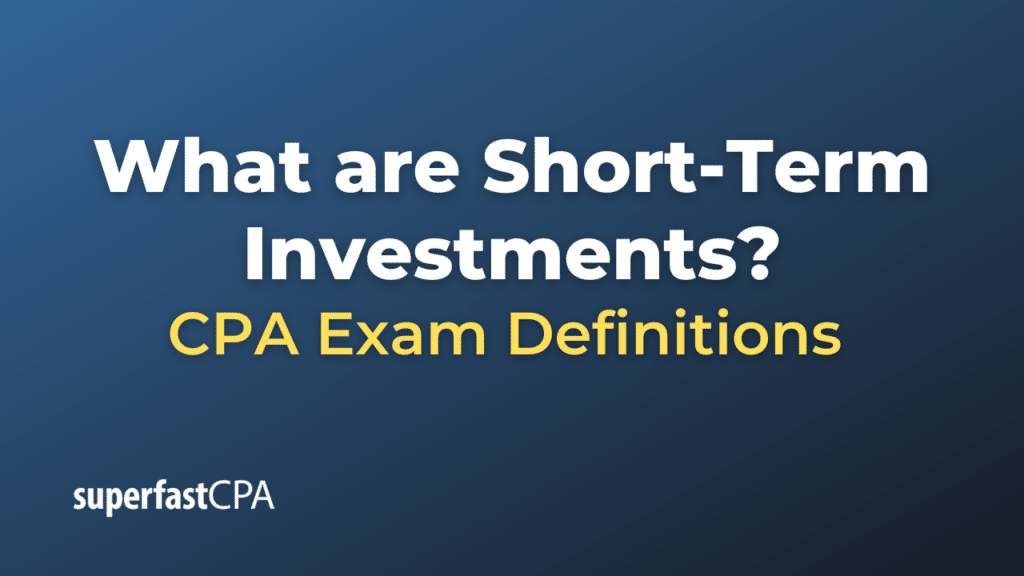Short-Term Investments
Short-term investments, also known as marketable securities or temporary investments, are financial instruments that are expected to be converted into cash within a short timeframe, typically within one year. They are positioned between cash and long-term investments on a company’s balance sheet and are often used by businesses to park excess cash, which can be quickly converted when needed, while also earning some return.
There are several characteristics and types of short-term investments:
- Liquidity: They are highly liquid, which means they can be quickly sold or redeemed without significant loss in value.
- Safety: While no investment is entirely without risk, short-term investments are generally considered lower risk than long-term investments. The primary concern is preserving the capital, rather than achieving high returns.
- Short Maturity: They have a short lifespan, usually less than one year, though they can go up to three years.
- Types:
- Treasury Bills: These are short-term securities issued by the government. They are considered one of the safest investments.
- Commercial Paper: Short-term unsecured promissory notes issued by companies. It’s a way for companies to borrow money for short-term liquidity needs.
- Money Market Funds: Mutual funds that invest in short-term, high-quality investments like treasury bills and commercial paper.
- Certificates of Deposit (CDs) : Time deposits with banks that pay interest. They have specified durations and typically penalize for early withdrawal.
- Bankers’ Acceptances: A short-term debt instrument issued by a company that is guaranteed by a commercial bank.
- Short-Term Government Bonds: These are government-issued bonds that mature in a short time frame.
- Short-Term Corporate Bonds : Bonds issued by corporations that mature in a short time frame.
- Yield: Typically, the yield or return on short-term investments is lower than that of long-term investments. This is a trade-off for their safety and liquidity.
- Use by Companies: Companies often use short-term investments to manage their cash flow. Instead of letting excess cash sit idle in a bank account, companies can earn a return on these funds by placing them in short-term investments.
- Use by Individuals: Many individual investors use short-term investments as a parking place for funds they’ll need in the near future, like for an upcoming large purchase or emergency fund.
It’s essential to understand the characteristics and purposes of any investment and to ensure they align with one’s financial goals and risk tolerance.
Example of Short-Term Investments
Let’s take an example of a hypothetical company, BlueTech Inc., to understand short-term investments.
Background: BlueTech Inc. is a tech company that recently had a successful product launch, leading to a significant influx of cash from sales. They anticipate some large expenses in the next year due to a planned expansion, but for now, they have excess cash on hand.
Scenario:
- BlueTech Inc. has $5 million in excess cash after accounting for its operational costs and immediate financial obligations.
- Instead of letting this money sit idle in a bank account earning minimal interest, the CFO of BlueTech decides to invest it to generate some returns.
- After evaluating various options, the CFO chooses a combination of short-term investments:
- $2 million in a Money Market Fund.
- $1.5 million in a 6-month Certificate of Deposit (CD) with a competitive interest rate.
- $1 million in Treasury Bills.
- $500,000 in Commercial Paper from a highly reputable corporation.
- All these investments will mature within a year, aligning well with the company’s planned expansion.
Outcome:
- Over the span of several months, these short-term investments yield returns. The exact return depends on the interest rates and market conditions, but for this example, let’s assume BlueTech earns a total of $75,000 from its investments.
- By the end of the year, BlueTech has not only preserved its capital (the original $5 million) but also earned additional money from its short-term investments, giving it $5.075 million.
- When the time comes for the planned expansion, BlueTech liquidates these investments, providing them with the necessary funds, plus the additional returns.
Conclusion: By wisely investing its excess cash in short-term investments, BlueTech Inc. managed to generate a return on funds that would have otherwise remained idle. The investments also remained relatively liquid, ensuring the company could access its funds when the time came for its planned expenses.













